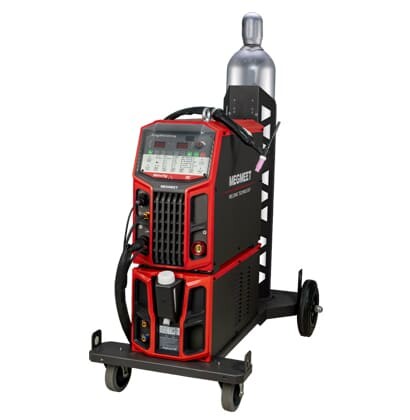In the realm of industrial welding, selecting the right welding method is paramount for achieving high-quality results. CO? Shielded Arc Welding, Manual Metal Arc (MMA) Welding, and Tungsten Inert Gas (TIG) Welding are three widely used techniques, each with unique advantages and specific applications. This guide delves into the principles, equipment, characteristics, and application fields of these methods, providing a clear comparison to help you choose the best approach for your projects.
I. Understanding the Welding Methods
Before comparing these techniques, it's essential to understand their fundamental principles:
Definition: A semi-automatic or fully automatic arc welding method using carbon dioxide as a shielding gas.
Process: The arc between the welding wire and the workpiece melts the wire, fusing it with the workpiece to form a weld seam. CO? decomposes into carbon monoxide and active carbon, enhancing the weld's mechanical properties.
Definition: A manual arc welding method using flux-coated electrodes.
Process: The arc between the electrode and the workpiece melts the electrode, fusing it with the workpiece. The flux generates shielding gas, slag, and alloying elements, protecting the weld pool and improving weld quality.

Definition: An arc welding method using inert gas (argon) for shielding.
Process: A non-consumable tungsten electrode creates an arc with the workpiece, melting a filler metal (if used) to form the weld. Inert gas protects the weld pool, ensuring high purity and mechanical properties.

II. Welding Equipment Overview
Each method requires specific equipment, influencing portability, cost, and operational complexity:
1) CO? Shielded Arc Welding Equipment:
DC or AC power sources
CO? gas sources, pressure gauges, regulators, and flow meters
Wire feeders, conduits, nozzles, and clamps
2) MMA Welding Equipment:
3) TIG Welding Equipment:
DC or AC power sources
Inert gas sources (argon), pressure gauges, regulators, and flow meters
Tungsten electrode holders, tungsten electrodes, conduit, nozzles, clamps
III. Welding Characteristics Comparison
Understanding the strengths and weaknesses of each method is crucial for selecting the right technique:
1. CO? Shielded Arc Welding:
1) Advantages:
High welding speed and production efficiency
Smooth weld surface with minimal porosity
Minimal deformation and heat-affected zone
Flexible operation in various positions
Affordable CO? gas
2) Disadvantages:
Generates smoke and dust, impacting the environment and health
Prone to spatter, requiring post-weld cleaning
Poor arc stability, affected by wind
2. MMA Welding:
1) Advantages:
Simple, portable equipment
Easy to learn and operate
Versatile for various materials and thicknesses
Can weld without power or in unstable conditions
2) Disadvantages:
Weld quality is dependent on electrode type and storage
Low efficiency, high electrode consumption, and cost
Generates smoke and slag, impacting the environment and health
Significant welding deformation and heat-affected zone
3. TIG Welding:
1) Advantages:
High-quality welds with purity and excellent mechanical properties
Minimal porosity and smooth surface
Suitable for non-ferrous metals like stainless steel and aluminum alloys
Minimal deformation and heat-affected zone
2) Disadvantages:
Slow welding speed and low production efficiency
High cost of inert gas
Complex equipment and challenging operation
Arc light and UV radiation pose eye and skin hazards
IV. Application Fields
Each welding method excels in specific industries and applications:
1. CO? Shielded Arc Welding:
Ideal for welding black metals like low-carbon steel and low-alloy steel.
Widely used in automotive, shipbuilding, bridge construction, and general construction industries.
2. MMA Welding:
Suitable for welding carbon steel, stainless steel, and cast iron.
Commonly used in repair, installation, and maintenance works where flexibility and simplicity are key.
3. TIG Welding:
Preferred for non-ferrous metals such as stainless steel, aluminum, magnesium, and titanium alloys.
Frequently employed in high-tech sectors like aerospace, nuclear energy, and chemical industries, where high purity and precision are critical.
V. Tips for Choosing the Right Welding Method
Material Type: CO? for steel, MMA for versatility, TIG for non-ferrous metals.
Equipment Availability: CO? and TIG require specific gases and equipment; MMA is more portable.
Skill Level: MMA is beginner-friendly; TIG demands more expertise.
Environment: MMA suits outdoor or remote settings; CO? and TIG are ideal for controlled environments.
Cost and Efficiency: CO? offers high efficiency at lower costs; TIG provides premium quality at higher costs.
VI. Optimizing Welding Performance
Use High-Quality Consumables: Ensure electrodes and wires are stored properly to prevent moisture absorption.
Maintain Equipment: Regularly clean and service your welding machines for consistent performance.
Control Welding Parameters: Adjust amperage, voltage, and travel speed based on the method and material.
Post-Weld Cleaning: Essential for removing slag and oxide layers, especially in stainless steel welding.
VII. Safety First: Protecting Yourself and Your Environment
Personal Protective Equipment (PPE): Always wear helmets, gloves, and appropriate clothing to protect against spatter and UV radiation.
Ventilation: Ensure good airflow to dissipate fumes and particles, especially in enclosed spaces.
Control Welding Parameters: Adjust amperage, voltage, and travel speed based on the method and material.Fire Safety: Keep flammable materials away from the welding area and have fire extinguishers nearby.
Conclusion
Selecting the optimal welding method depends on material type, equipment availability, skill level, environment, and cost considerations. CO? Shielded Arc Welding excels in speed and efficiency for steel applications, MMA Welding offers versatility and portability, and TIG Welding provides unmatched quality for non-ferrous metals. By understanding their strengths and weaknesses, you can make informed decisions to achieve professional-grade welds.
Megmeet Welding Technology stands as a leader in providing advanced welding solutions tailored to meet your specific needs. Whether you're working on industrial machinery, automotive components, or high-precision aerospace parts, Megmeet's high-quality equipment ensures superior results. Visit our News Center or follow our LinkedIn page for the latest insights, tips, and product updates to enhance your welding expertise.
Related articles:
1. Spot Welding vs. TIG Welding vs. MIG Welding: Differences & How to Choose?
2. Welding Aluminum vs. Welding Steel: Key Differences
3. Arc Welding vs. Laser Welding: The Key Differences
4. Pulsed vs. CW Laser Welding: Key Differences | Expert Insights
5. Pros and Cons of Stick Welding and MIG Welding





